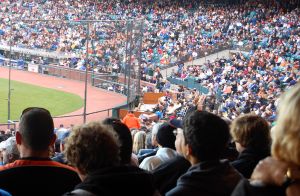Each year millions of Americans go to stadiums to attend sports games, concerts, and other spectator events. While events such as baseball games, hockey games, races, and concerts can be fun and memorable, there are instances when these experiences may turn into dangerous situations and put spectators at risk for serious injury and even death.
Owners and managing companies of these large venues are well aware of the risks posed to visitors of their establishments, and to counter the risk of legal liability for injuries visitors may sustain, most tickets (whether for sports events or other spectator events) are printed with a disclaimer and an assumption of potential risk statement. Essentially these statements waive legal responsibility for the venue, and in purchasing the ticket the patron understands the risk for injury and assumes accountability should he or she be injured during the event.
 In addition to the precautionary disclaimer on tickets, venues that regularly host sporting events such as baseballs games or hockey games are outfitted with protective equipment to prevent spectator injury. At Fenway Park for example, there is a protective net behind home plate and surrounding sections to protect fans from wild pitches and foul balls. And at the Bruin’s home ice rink at the TD Garden, there is protective glass as well as netting surrounding the ice to shield spectators from flying hockey pucks.
In addition to the precautionary disclaimer on tickets, venues that regularly host sporting events such as baseballs games or hockey games are outfitted with protective equipment to prevent spectator injury. At Fenway Park for example, there is a protective net behind home plate and surrounding sections to protect fans from wild pitches and foul balls. And at the Bruin’s home ice rink at the TD Garden, there is protective glass as well as netting surrounding the ice to shield spectators from flying hockey pucks.
Though the ticket disclaimers as well as preventative measures serve to protect venues from legal responsibility should someone be seriously injured, and courts typically disregard personal injury claims because of that rule, there are some exceptions. Personal injury and negligence claims may be filed if an injured party can prove that the owners of the sports stadium or entertainment venue did not take adequate measures to keep them safe. An example of a premises liability situation that does not fall under the “assumption of risk” disclaimer could include a faulty railing or broken steps that cause a fan to fall and become injured because of faulty property maintenance.
There are many other types of injuries that may not be included in the assumption of risk category including:
• Over-serving alcohol to visibly intoxicated patrons • Physical assaults and fan violence • Inadequate security and lack of crowd control • Improper lighting that causes bodily injury • Slip and fall accidents on unmarked wet surfaces • Injuries from thrown objects • Falls from balconies or elevated heights that lack proper safety railings
• Parking lot and pedestrian injuries • Food poisoning
• Stairwell incidents
• Elevator/escalator accidents • Sexual assaults
Property owners have an obligation to keep their premises safe and free of hazardous conditions that could cause serious injury. If you or a loved one was injured while attending an event at an arena or sports stadium, call one of the experienced Boston Premises Liability Attorneys at the law offices of Altman & Altman. Through careful review, our lawyers can determine whether you have grounds to file a claim against an owner of a venue for negligence and failing to protect your safety. Our team of seasoned attorneys has nearly 50 years of experience handling premises liability cases, and we have successfully recovered millions in compensation for our clients. All initial consultations are free and our lawyers are available around the clock to answer any questions you may have regarding your case.
 Boston Injury Lawyer Blog
Boston Injury Lawyer Blog









